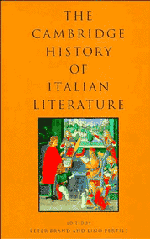Book contents
- Frontmatter
- Origins and Duecento
- The Trecento
- The Quattrocento
- The Cinquecento
- The Seicento: Poetry, Philosophy and Science
- Narrative prose and theatre
- The Settecento
- The Age of Romanticism (1800–1870)
- 27 The Romantic controversy
- 28 Monti
- 29 Foscolo
- 30 Leopardi
- 31 Manzoni and the novel
- 32 Other novelists and poets of the Risorgimento
- 33 Opera since 1800
- The Literature of United Italy (1870–1910)
- The Rise and Fall of Fascism (1910–45)
- The Aftermath of the Second World War (1945–56)
- Contemporary Italy (since 1956)
- Bibliography
- References
31 - Manzoni and the novel
from The Age of Romanticism (1800–1870)
Published online by Cambridge University Press: 28 March 2008
- Frontmatter
- Origins and Duecento
- The Trecento
- The Quattrocento
- The Cinquecento
- The Seicento: Poetry, Philosophy and Science
- Narrative prose and theatre
- The Settecento
- The Age of Romanticism (1800–1870)
- 27 The Romantic controversy
- 28 Monti
- 29 Foscolo
- 30 Leopardi
- 31 Manzoni and the novel
- 32 Other novelists and poets of the Risorgimento
- 33 Opera since 1800
- The Literature of United Italy (1870–1910)
- The Rise and Fall of Fascism (1910–45)
- The Aftermath of the Second World War (1945–56)
- Contemporary Italy (since 1956)
- Bibliography
- References
Summary
Early life and works
Cesare Beccaria, famous in the 1760s throughout the civilised world for advocating the abolition of torture and capital punishment, wished to stop the affair between his lively and beautiful daughter, Giulia, and Giovanni Verri, the playboy brother of his friends Pietro and Alessandro (renowned editors of Il Caffè, one of the most influential journals of the Italian Enlightenment; see above, pp. 378–80). Pietro arranged Giulia's marriage to the obscure Count Pietro Manzoni, twenty-six years her senior, as if that could stop the affair. In 1785 she gave birth to Alessandro, whom her husband acknowledged although he was (presumably) Giovanni Verri's son. After seven years in a steadily worsening relationship, Giulia went to live with Carlo Imbonati, a wealthy merchant banker, and Alessandro was farmed out to various religious boarding schools which gave him very unpleasant memories but a good classical education. By reaction he became a confirmed anti-clerical and challenger of established authority, ready to join the Romantic movement, and make friends with some of its acknowledged leaders, like Ermes Visconti and Federigo Confalonieri. His nationalism and love of history were stimulated by his contacts with the Neapolitan historian Vincenzo Cuoco, while his enthusiasm for poetry was kindled by sympathetic advice from Monti and Foscolo.
Imbonati, who had never met Alessandro, invited him to Paris early in 1805, but died suddenly before his arrival, making Giulia his heiress and laying the foundations of her son's future financial well-being (a fact that later on must have seriously troubled his conscience). Through his mother's circle of friends Alessandro came into contact with a group of intellectuals known as les idéologues, from the views of one of them, the philosopher Antoine Destutt de Tracy, who believed that the philosopher's task was chiefly to analyse the origins and mechanism of mental processes: philosophy was to become 'ideology' in the special sense of 'enquiry into the development of ideas'.
- Type
- Chapter
- Information
- The Cambridge History of Italian Literature , pp. 427 - 439Publisher: Cambridge University PressPrint publication year: 1997



